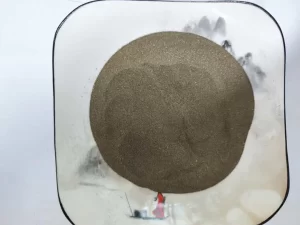In the world of industrial grinding, choosing the right abrasive material is essential for performance and cost efficiency. Pyrite, a naturally occurring mineral, has become increasingly popular as an abrasive in resin-bonded grinding wheels. These versatile grinding wheels are used for tasks like cutting, shaping, and finishing materials such as metals, ceramics, and stone. In this article, we explore the role of high quality pyrite in resin-bonded grinding wheels, its benefits, applications, and important considerations for its use in industrial settings.

What Are Resin-Bonded Grinding Wheels?
Resin-bonded grinding wheels are essential tools used in various grinding applications. These wheels consist of abrasive particles bound together by a resin binder, providing a tough, durable surface for grinding, polishing, and cutting. The abrasives—such as silicon carbide, aluminum oxide, or even diamond—are responsible for the cutting action, while the resin binds them into a solid, functioning tool.
While traditional abrasives dominate the market, pyrite (iron disulfide, FeS₂) has become a cost-effective and efficient choice. The properties of pyrite offer unique advantages when used in resin-bonded grinding wheels, especially in terms of performance, durability, and cost-effectiveness.
What Is Pyrite and Why Is It Used in Grinding Wheels?
Pyrite, often called "fool's gold," is an iron-sulfur mineral that has gained recognition for its usefulness as an abrasive. Pyrite is not as hard as premium abrasives like synthetic diamond or cubic boron nitride, but its sharp-edged crystal structure and brittleness make it highly effective in certain grinding applications.
When used in resin-bonded grinding wheels, pyrite can provide a consistent grinding action by continually breaking down into sharp particles. This helps maintain the wheel’s cutting performance throughout its lifespan.
Benefits of Pyrite in Resin-Bonded Grinding Wheels
Here are the key benefits of using pyrite in resin-bonded grinding wheels:
1.Enhanced Grinding Efficiency
Pyrite’s brittleness makes it ideal for high-efficiency grinding. As the abrasive particles break during use, they expose fresh, sharp edges, increasing material removal rates. This results in faster grinding and more effective cutting of metals, ceramics, and other materials.
2.Longer Wheel Life
Unlike other abrasives, pyrite continuously exposes fresh abrasive surfaces as it breaks down during use. This means that pyrite-based grinding wheels often last longer than other types, making them a durable option for industrial grinding.
3.Cost-Effectiveness
One of the primary advantages of pyrite is its affordability. Compared to premium abrasives like diamond or cubic boron nitride, pyrite is much less expensive, making it a highly cost-effective choice for high-volume grinding operations.
4.Environmentally Friendly
Pyrite is a naturally occurring mineral, which makes it a more eco-friendly choice than synthetic abrasives. Its use in grinding wheels supports environmentally conscious manufacturing processes.
Considerations When Using Pyrite in Resin-Bonded Grinding Wheels
While pyrite-based grinding wheels offer numerous benefits, there are a few considerations to keep in mind:
- Wheel Composition
The pyrite-to-resin ratio is critical in achieving optimal grinding performance. Too much pyrite can make the wheel too brittle and prone to breakage, while too little can reduce its effectiveness. Proper formulation is essential for balancing durability and abrasive action.
- Grinding Parameters
Pyrite-based grinding wheels perform best under specific conditions. Adjusting factors like grinding speed, pressure, and feed rate can significantly impact wheel performance. Pyrite may wear more quickly at high speeds, while slower grinding rates might reduce efficiency.
- Health and Safety
Like all abrasive materials, fine pyrite dust can pose health risks if inhaled. It's essential to implement dust control measures, such as ventilation systems and personal protective equipment (PPE), including masks and goggles, to ensure safety in the workplace.
Applications of Resin-Bonded Grinding Wheels with Pyrite
Pyrite-based grinding wheels are used in a wide range of industries for various applications:
- Metalworking: In automotive manufacturing, toolmaking, and aerospace, pyrite-based wheels are commonly used for precision grinding, deburring, and finishing of metal components.
- Stone and Concrete Cutting: Due to its brittleness, pyrite excels in cutting and grinding stone, concrete, and ceramics, where sharp edges are necessary for clean, precise cuts.
- Tool Sharpening: Pyrite is also effective for sharpening tools, offering a reliable and efficient abrasive for blades, cutting tools, and industrial machinery components.
- Ceramic and Composite Grinding: For ceramic and composite material grinding, pyrite-based wheels are valued for their ability to provide a controlled, consistent abrasive action without causing damage to delicate materials.
Conclusion: Why Choose Pyrite for Resin-Bonded Grinding Wheels?
In summary, pyrite in resin-bonded grinding wheels provides a range of benefits, including increased grinding efficiency, longer wheel life, and cost-effectiveness. Its sharp-edged, brittle nature makes it particularly useful for metalworking, tool sharpening, and stone cutting applications.
However, to achieve optimal results, it is important to monitor factors like the pyrite-to-resin ratio, grinding parameters, and worker safety. With careful formulation and use, pyrite-based grinding wheels can be an efficient and environmentally friendly option for a variety of industrial grinding applications.
